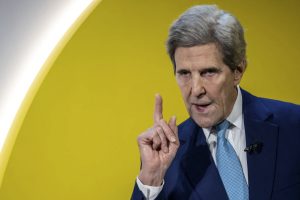
- So far, nine out of ten people seeking asylum in Sweden have not had identification. They can then adapt their background stories to increase their chances of being granted asylum.
- Stockholm’s Chief Press Officer had written that the police might be perceived as racist, and therefore should not report physical descriptions to the public. Ironically, it is journalists who have more or less forced the police to stop using descriptions such as skin color, by labeling the police “racist” every time a person of color appears on a wanted list.
- “There are those who wish to make this an issue of ethnicity. It is not. It is an issue that concerns culture and values. Our free and open society is founded on personal freedom, Western humanism and Christian ethics. These values must not only be upheld, they must be defended.” — Ebba Busch Thor, leader of the Christian Democrat Party.
January 4: After an autumn of chaos, when huge numbers of asylum seekers flooded into Sweden, the government was finally forced to implement border controls on its border with Denmark. Now, only those with valid identification documents are allowed to board trains and ferries to Sweden — effectively keeping people who have destroyed their IDs out of the country. How long it will take before most asylum seekers bring identification papers — genuine or fake — remains to be seen. So far, nine out of ten people seeking asylum in Sweden have not had identification. They can then adapt their background stories to increase their chances of being granted asylum.
January 5: The alternative news site Nyheter Idag reported that two 15-year-old boys living at an asylum house for “unaccompanied refugee children,” in the small town of Alvesta, were detained on suspicion of raping a younger boy. When the victim reported the incident, the police were alerted and the 15-year-olds were brought in for questioning. One of them has confessed to some of the accusations.
January 6: In another case of homosexual child-rape, two men who claiming to be 16-years-old were arrested on suspicion of raping a boy at an asylum house for “unaccompanied refugee children” in Uppsala. The rape was discovered when the younger boy visited a hospital, along with his legal guardian. One of the suspected rapists was released after being questioned by police, but is still under suspicion. The other was remanded into custody.
The most publicized rape of a boy so far is now awaiting a verdict from the Court of Appeals. In December 2015, two 16-year-olds were sentenced by the District Court to juvenile detention for eight and ten months, respectively. The sentences stand out as extremely lenient, considering what was done to the 15-year-old victim. All involved parties came from Afghanistan and lived in the same asylum house for “unaccompanied refugee children.” One day, the older boys asked the 15-year-old if he wanted to come to the store with them. On their way back, the older boys pushed the 15-year-old onto a muddy field, hit and kicked him, shoved mud into his mouth, and then raped him — twice. They warned him that if he told anyone, he would lose his “honor.” That night, however, the boy broke down and told the staff at the asylum house what had happened.
January 9: The alternative news site Nyheter Idag revealed that the respected daily newpaper Dagens Nyheter had covered up a story about the sexual assaults of girls and women (mainly by Afghan men) at the “We Are Sthlm” music festival in 2014 and 2015 — after knowing about at least one of the incidents for a year and a half. Dagens Nyheter, which routinely brands alternative media sites “hate sites,” hurried to place the blame on the Stockholm Police — who partly accepted it. National Police Chief Dan Eliasson promised to investigate why the information had been kept secret.
January 10: An opinion poll showed that 59% of the Swedes support the border identity checks implemented a week earlier. Even in the southern province of Skåne, where many commuters are affected by trains delayed to and from work in Denmark, the identity checks have a solid approval rate. 62% of the people polled in Skåne said that they thought the border controls were a good thing.
January 11: The total number of asylum seekers to Sweden in 2015 was made public: close to 163,000. The most common nationalities were Afghan, Iraqi and Syrian. Afghan arrivals increased exponentially, especially in the form of “unaccompanied refugee children.” 7,049 “children” sought asylum in Sweden in 2014. In 2015, that number had exploded to an unfathomable 35,369 — 66% of which came from Afghanistan. Sweden has now decided to start age-testing asylum seekers claiming to be children. Until now, the “child’s” word has been taken at face value. Officials at the Immigration Service were even instructed not to question anyone who appears to be under the age of 40.
January 12: Rumors flew among liberal Swedish editorial writers that it was, in fact, Russian president Vladimir Putin behind Nyheter Idag’s big revelation about the sexual attacks at the music festival in Stockholm. Isobel Hadley-Kamptz, a former employee of the newspaper accused of the cover-up (Dagens Nyheter), tweeted:
“We know that Russia is actively working to spread disinformation in other countries to lower cohesion and trust. We also know that the populist right-wing campaign is operating on the thesis that society is not to be trusted (especially not the media). And yet, when a populist right-wing site with clear connections to Putin starts a campaign against DN [Dagens Nyheter] and the media, reasonable people go along with it?”
The idea of Putin’s supposed involvement in the Swedish media business was apparently not considered strange by either Dagens Nyheter’s editor-in-chief, Peter Wolodarski, or the prominent columnist, Andreas Ekström, of the respected daily newspaper Sydsvenskan, who both lent their support to the claim that Putin is a puppeteer of the Swedish media.
January 12: Middle-aged men pretending to be teenagers have the right to round-the-clock care in Sweden. The cost is astronomical, but never questioned. If you are 103 years old and Swedish, however, you do not have the same right. A woman recently learned this when she asked to be moved into a nursing home. She suffers from heart problems, angina and dizzy spells, and she has a pacemaker. She uses a walker, but because of the dizziness, her balance is off and she frequently falls. When home-care service helpers come in the evenings she feels uneasy: the caregivers are mostly complete strangers to her. But the municipality did not feel that these ailments were enough to allow her into a home with constant supervision. The 103-year-old woman had to sue the municipality in an Administrative Court, where she finally received a favorable verdict.
January 12: Another cherished myth turned out to be true: the one about police covering up crimes committed by immigrants. The Swedish police, when trying to track down criminals, have explicit instructions not to include descriptions of suspects which could be construed as “racist.” Svenska Dagbladet broke the story after a confidential letter was leaked to the newspaper. The letter had apparently gone out to all police personnel in September 2015. Stockholm’s Chief Press Officer had written that the police might be perceived as racist, and therefore should not report physical descriptions to the public. Ironically, it is journalists who have more or less forced the police to stop using descriptions such as skin color, by labeling the police “racist” every time a person of color appears on a wanted list.
January 13: The leader of the Christian Democrat Party (Kristdemokraterna), Ebba Busch Thor, wants to deport asylum seeker who are sex offenders — even if they have grounds to be granted asylum. In an opinion piece in the conservative daily newspaper Svenska Dagbladet, she wrote:
“If asylum seekers to Sweden commit sex crimes, they should have their asylum application rejected and be swiftly dispatched out of the country. Even for people with residence permits, deportation should be a much more common legal effect.
…
“There are those who wish to make this an issue of ethnicity. It is not. It is an issue that concerns culture and values. Our free and open society is founded on personal freedom, Western humanism and Christian ethics. These values must not only be upheld, they must be defended.”
January 14: An 18-year-old was indicted for a hand grenade attack against a police van in the Stockholm suburb of Tumba last year. He was charged with attempted murder and various other crimes: two aggravated robberies, weapons offenses, harboring a criminal, and one mugging.

On January 14, an 18-year-old was indicted for a hand grenade attack against police in Stockholm last year. Left: A police van is riddled with shrapnel (left) from the hand grenade attack. The four policemen in the vehicle at the time could have been killed if the van had not been armored. At right, the Malmö police bomb squad disarms a hand grenade found in Landskrona, on September 22.
|
January 16: The issue of possible media cover-ups of important news in Sweden kept engaging people. “The idea that the media covers things up,” stated Jesper Strömbäck, a professor of media and communication studies, “is reminiscent of a conspiracy theory… To deselect, sometimes, certain information is about news values.”
Strömbäck’s statement led columnist Sakine Madon to ask her colleagues on Facebook and Twitter if they had ever been asked to tone down or avoid topics that could “benefit the [immigration-critical party] Sweden Democrats”? One experienced journalist replied that at several news organizations, there had been an unspoken policy not to favor the Sweden Democrats and thus contribute to “xenophobia.”
But one does not reveal editorial secrets and get away scot-free. Ms. Madon had to endure a wave of harsh, and mostly unfair, criticism. She wrote in response:
“Instead of engaging in this childish mudslinging, journalists should ask themselves questions such as: What do we do about this problem? Where do we draw the line between activism and journalism? Should we be openly opposed to SD [Sweden Democrats] , or should we stick to being neutral?”
January 18: Two men were indicted for animal cruelty, after they had slaughtered sheep according to halal slaughter [permitted Islamic method of animal slaughter] at a pizzeria in Falkenberg. Halal slaughter does not allow for stunning the animal, and is illegal in Sweden, so the men tried to sneak the two sheep into the restaurant. They were, however, observed by a witness. When the police arrived, the sheep were already dead and lying on the concrete floor in a pool of blood.
January 18: The number of sexual assaults in public swimming pools skyrocketed in January. Newspapers were filled with stories about “cultural clashes” in public pools. Distressed pool staff members called for adults to take responsibility for the “unaccompanied refugee boys” who grope girls. On this particular day, an asylum seeking 16-year-old was arrested by the police when he, along with a gang of other immigrant youths, molested a 15-year-old Swedish girl. “At some point he tried to run his fingers under the bottom of her bathing suit. The youths also touched her breasts over the bathing suit and grabbed her legs,” the county police officer in charge, Kenneth Sundin, told the local daily newspaper Upsala Nya Tidning.
January 18: Female bus drivers in Lessebo felt they had no choice but to call in sick after being harassed by newly-arrived migrants. The altercations have mostly been about migrants trying to use invalid tickets, and not accepting the driver’s refusal to let them on board without proper travel documents. Evenings and nights have been particularly troublesome. According to one bus operator, the problems could have been avoided “if the Immigration Service staff had handed out written information in several languages that explained to the newly arrived immigrants what the rules are.” Some drivers, to avoid trouble, simply let the migrants do as they pleased. One father, for example, demanded that as his wife had an appointment to visit a prenatal care facility, his whole family be allowed to travel for free. The driver was told to shut up, and finally gave in and let them ride the bus for free.
January 18: The National Alliance for Sexual Enlightenment (Riksförbundet för sexuell upplysning), RFSU, demanded mandatory sex education for all “unaccompanied refugee children.” However, the Alliance did not want just any old dusty sex education — it demanded that the classes should be conducted from a “norm-critical gender perspective.”
After the recent reports about sexual assaults against women in Stockholm, Kalmar, Cologne and other places, RFSU said it felt that the time was right for young men from highly patriarchal societies to become “norm-critical.”
In an op-ed, RFSU wrote: “Sex education built on a gender conscious and norm critical foundation has turned out to be a key factor not just to strengthen the youths’ health, but also to counteract gender based violence. This is true of all young people, regardless of background. It is a right and a possibility that Sweden must not neglect.”
January 19: The huge influx of young men to Sweden has given the country a skewed gender balance that is quite unsettling, according to Professor Valerie M. Hudson, of the Program on Women, Peace and Security at Texas A&M University. In the Swedish daily Göteborgs-Posten, she wrote: “My research shows that there are several negative consequences to society when imbalance in the gender distribution increases, something that Sweden needs to have a serious discussion about.”
The imbalance is overwhelmingly due to immigration. The extremely large migration to Sweden in 2015, in which 71% of the immigrants were males, has increased the imbalance in gender distribution significantly. “From official immigration statistics,” she went on, “one can conclude that at the end of 2015 there were 123 16-17-year-old boys for every 100 girls in the same age span.” Comparatively, China, which has one of the world’s largest imbalances in gender distribution, ‘only’ has 117 boys for every 100 girls in the same age group. “Having studied gender distribution in China and India for 15 years, it is amazing to me that Sweden has a worse imbalance than either of these two countries.”
In the article, Professor Hudson also lists several reasons why gender imbalance is dangerous, and wonders: “How is it possible that Sweden, one of the most acknowledged feminist countries in the world, does not seem to care about such sharp fluctuations in gender distribution?”
January 19: At the school Sjumilaskolan in the Biskopsgården area of Gothenburg, anarchy is said to be prevalent. According to a report from the School Board (Skolinspektionen), the school’s teachers are afraid of their own students. At Sjumilaskolan, about 60 languages are spoken; fewer than a third of the students pass all subjects; violence, threats and abuse are commonplace, and no adults at the school dare put a stop to any of the misconduct. Last semester, shootings occurred in the schoolyard, and now several students say that they do not dare to go to school anymore.
The School Board report states:
“Some teachers have told us that they themselves have been in verbal and physical conflicts with students, and that the teachers are sometimes afraid that students will kill each other. The teachers describe a general anxiety at the school, and also tell us that they feel there is a risk that riots will occur in the high school.”
In November 2015, about a week after the School Board’s inspection, there was indeed a riot at the school, during which students smashed chairs, tables and paintings in one of the classrooms, and the teachers had to call the police to stop the unrest. The School Board now demands that Gothenburg municipality immediately address the problems at Sjumilaskolan. If the problems have not been dealt with by April 29, the municipality will face a 700,000 kronor ($82,000) fine.
January 20: Former terror suspect Mutar Muthanna Majid demanded one million kronor ($117,000) in damages from the Swedish government. According to his lawyer, Peter Ataseven, “He was suspected of very serious criminal activity. But above all, he has suffered from the media coverage, since he was depicted as a terrorist and has had his name and picture publicized.”
What prompted the Security Service to arrest Muthanna Majid on November 18 — why he was suspected of preparing terrorist attacks, raising the threat level in Sweden to a four on a five point scale and unleashing a massive manhunt — is still a mystery. The police at the time seemed confident, and most media outlets published the name and photograph of the suspect. The next evening, November 19, a large police force apprehended Majid at the asylum house in Boden where he lived. He was questioned, but three days later, the District Attorney decided to release him; he was no longer suspected of any wrongdoing.
January 24: The Stockholm police warned that they could no longer cope with the pressure of dealing with the Moroccan street kids running wild in the city. There are hundreds of young men from Morocco and other North African countries staying illegally in Sweden, mainly in Stockholm and Gothenburg.
SVT Nyheter, a public television news program, talked to a police officer who asked to remain anonymous:
“These guys are a giant problem to us. They steal things everywhere and beat up the security guards at the central train station. They grab girls between their legs and slap them when they protest. The police all know about this. The situation is abysmal – I would never let my children go to the train station; no policeman would.”
A few days later, some vigilantes seemed to have decided to “clean up” the streets. According to several media sources, a large gang of masked men at the Stockholm central train station handed out flyers that contained messages along the lines of “enough is enough!” The flyers encouraged people to take the law into their own hands, find any street kids in the area and “give them what they deserve.”
When the incident was widely publicized in the mainstream media, suddenly the street kids were renamed “unaccompanied refugee children.” Strangely, the police have yet to receive a single complaint about abuse from the street kids, and there is a question if any attacks ever took place at all.
January 24: Mauricio Rojas, who for many years was the “integration policy” spokesperson for the Liberals, wrote in a column in Svenska Dagbladet:
“A country once characterized by a remarkable sense of solidarity — all the things the Swedish welfare state represented — has in a couple of decades been transformed into a multi ethnic community, where the bonds of fellowship between people have been significantly weakened.”
Rojas, once an immigrant from Chile to Sweden, had been considered too rough on immigrants; he was therefore outmaneuvered by the Liberals. He left the Parliament — and left Sweden — in the fall of 2008, and moved to Spain. Now and again he makes an appearance in the Swedish immigration debate. Few Swedes would have dared write what he wrote:
“These changes raise concerns for many people and pose important questions about the future towards which we are heading, in terms of national fellowship. We know how things were, but no one knows how they will be, and there are many who feel that Sweden has lost its soul and become a multicultural chaos. That is why nostalgia and a painful sense of alienation are growing in this country, but also a desire to pause, or at least slow down, the speed of transformation.”
January 24: Sweden’s universities and colleges had looked forward to a replenishment of their budgets by a total of 303 million kronor (over $35 million), but the money has been withheld. According to Social Democratic Minister for Higher Education and Research, Helene Hellmark Knutsson, the money will instead go to covering the “hugely increased costs in 2016 due to the large number of people fleeing from war and terror, and seeking asylum in Sweden.”
January 24: Another case of homosexual rape was uncovered at an asylum house, this time in the southern town of Ljungby. The police arrested a 22-year-old migrant, suspected of having molested a 15-year-old boy where they both lived.
January 25: 22-year-old Alexandra Mezher was stabbed to death by one of the residents at the asylum house for “unaccompanied refugee children” where she worked. The killer, Youssaf Khaliif Nuur, claimed to be 15 years old and from Somalia, and as in Sweden no medical age determination is routinely performed of those claiming to be children, the man was placed among teenagers. When the British newspaper, the Daily Mail, covered his detention and made fun of the Swedish authorities’ having accepted his claim of being 15 years old, the Swedish mainstream media labeled the Daily Mail a “hate web site,” much like the alternative Swedish media web sites, Avpixlat and Fria Tider. For some reason, the Daily Mail blocked most of their articles about the case for Swedish readers. Legal reasons were cited, but many speculated that government censorship was involved. In February, when the Immigration Service finally concluded that the suspected killer was not 15 but over 18 years of age, the correction was laconically reported by the Swedish media.
January 26: The Svea Court of Appeals increased the sentence for Congolese immigrant Loran Guy Mogi, who murdered his pregnant girlfriend, Therese Eriksson, in the town of Vårgårda. In the District Court, he was sentenced to 18 years in prison and deportation, but the Court of Appeals increased his sentence to life in prison: “Add to this,” the Court of Appeals wrote, “that (the woman) was pregnant and that the pregnancy was rather far gone, which X (the accused) was well aware of. In the Court of Appeals’ estimation this is a highly aggravating factor, because X by strangling the woman not only killed her, but also a budding life. In light of these facts, the court feels that the penalty value is life in prison.”


































